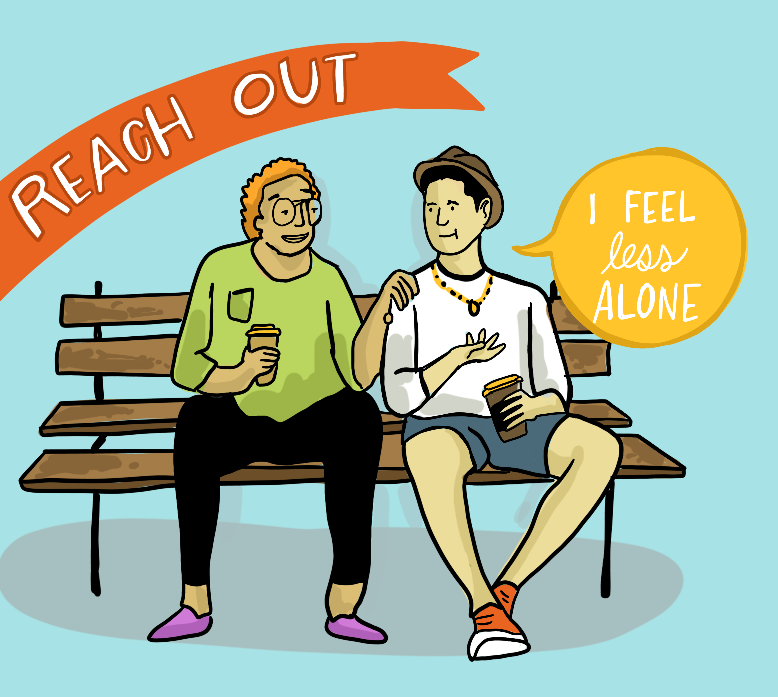There are also many accounts of strength in gay and bisexual men who that have coped with their experiences of stigma and discrimination. Research has found that the following contributes to better coping in queer men:
close relationships with friends and family
feeling connected to the gay community and perceiving it as supportive of LGBTQ2 people
advocating for themselves
accessing mental health supports
The following are testimonies of queer men and the strategies and tools that helped them buffer against adversity:
“Especially in high school, I had some teachers that were role models because I never really confided in anybody about what was going on at home but ... still I really appreciated the emotional stimulation and being able to escape ... School was an escape for me.”
(20s, European) (Adam et al., 2019)
“I just focused on things I could control, like I was an avid reader, I read a lot. I would do, I painted. I would watch TV, just things that I knew.”
(40s, French) (Adam et al., 2019)
“I was bullied a lot before everyone knew I was gay because I was very quiet and very dorky and you know, [...] then I came out and it just got worse because this kid that was always so invisible was like the center of relevance for 1200 students in school and it was just a lot of unnecessary attention and everyone was discussing my own personal life ... I identified a lot, and I know this is going to sound ridiculous: through this time Britney Spears and Amy Winehouse were going through a lot of like stuff in their lives, like they were doing drugs and stuff, and I saw how people were attacking them and how they were just dealing with their own thing personally and just taking their own time to heal, and I thought that I should do the same. Just take all these negative things that people are throwing at me, analyze why they’re doing it, and just take the best from that. Like, it wasn’t my fault that I grew up in this patriarchal, horrible, colonial society, and they didn’t really know how to deal with homosexuality. I always knew there wasn’t anything wrong with me, there was something wrong with them, so there was nothing for me to change.”
(20s, Caribbean-Latin American) (Adam et al., 2019)
“Ten years ago so I would go on the internet and I would go on these Latin websites and I would meet young guys, older guys or guys around my age and we would talk about our experiences or sensual experience or what not ... It was interesting to hear about their experiences but that’s the only way I could get information about the gay communities.”
(20s, Latin American) (Adam et al., 2019)
“In High School we never talked about it (sexual identity) much you know, especially I grew up in Northern Ontario you never talked about it. . . . I was conditioned, and grew up with the same notions that (gay people) ‘those people are disgusting, those people do horrible things.’. . . When I first came out in university, I went from having zero gay friends, not knowing a single gay person, to suddenly having 200 friends. Like that . . . that’s like a real fundamental shift, to suddenly have people.”
(50 years old) (Handlovsky et al., 2018)
“I felt sick and insecure, and I felt so scared, terribly scared. And the insecurity is just, it’s beyond description, it’s just this vacant, void feeling in the pit of your stomach that is just so hollow . . . it is exhausting . . . it wears you down. It kills your spirit. It forced me to go [to see a psychologist]. . . . It was helpful to admit that I was gay and I had never admitted it aloud up until that point . . . it took like five sessions to say it. Once it was said there was a portion of weight that was lifted off my shoulders, and yet the journey continues but that was the first step.”
(42 years old) (Handlovsky et al., 2018)
“Ask for help. Have an advocate. Peer navigation. People taking care of people. It’s a gift. My need for help doesn’t mean there is anything wrong with me. It actually means we’re in a help and healing process together.”
(48 years old) (Handlovsky et al., 2018)
“You have people that care about you. The best way to get through something that has you down is to talk to someone professional about it or to someone or people that are close to you. If you feel as though you are alone then you have to find strength in yourself to push forward whether it be mentally, physically, or spiritually, you’ll get through it!”
(Black GBMSM, 18-30 years old) (Barry et al., 2018)
Before I told my dad I was gay, we was very close we did everything together. Whenever I came out that I was gay, everything stopped … we went from each other everyday to now I’ve not seen or heard from my dad in about 3 years. I feel as though he is not worried about my happiness however worried about what people may say about him. But I’ve accepted myself and I love me, so I feel that my dad is missing out on my life because of who I choose to love.”
(Black GBMSM, 18-30 years old) (Barry et al., 2018)
